A Year of Civil Conversations Religious Leader Reflections: "The Myth of Closure" | by Rev. Margaret Somerville
In a society in which we feed ourselves on goals accomplished, problems solved, and questions answered, how do we handle unresolved loss? How do we bear the weight of grief that does not find closure? Krista Tippett interviewed Pauline Boss in an episode of On Being that aired on December 13, 2018. Boss is a family therapist who coined the term “ambiguous loss” to describe the type of loss associated with situations such as divorce, mental illness, aging, a death without a body to bury, or immigration. Boss and Tippett talk about these types of personal grief as well the societal grief associated with genocide or slavery, the suffering that is built into the DNA of a race, religion, or nation that is transmitted through generations.
Pauline Boss discusses the fact that grief cannot always find closure. We do not all progress through the stages made popular by Elizabeth Kübler-Ross until we reach acceptance. We cannot expect people to package up their grief and put it away because it has been long enough, or ask them to “move on” because it is easier for us to tick this off as another goal accomplished or problem solved. Instead, she asks us to normalize grief in our society. She urges us to treat the accompanying sadness with human connection.
As a Christian pastor, I am moved every time I attend Shabbat services and hear the Mourner’s Kaddish as part of the regular weekly liturgy. Those who mourn stand to recite this prayer. What a powerful acknowledgement of all those in the space who are holding grief! How do we normalize grief as a part of our worship - the grief that individuals are carrying, ambiguous or not, and the grief that we carry communally? How do we allow it to be present alongside our praise and thanksgiving?



Comments
Post a Comment